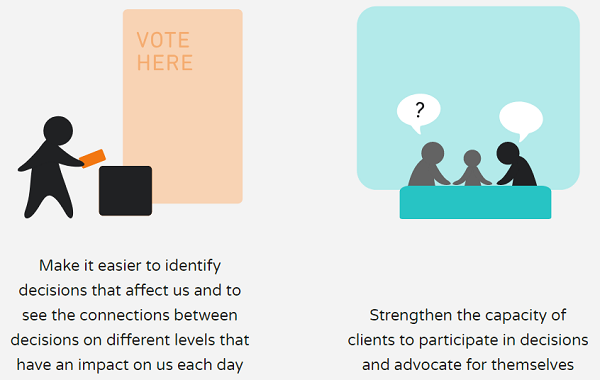- MN ABE Connect
- Archive
- How to Better Navigate Systems by Asking the Right Question
 December 12, 2016
December 12, 2016
How to Better Navigate Systems by Asking the Right Question
Stephanie Sommers, ACES CoordinatorI once tried to get my students to do a particular question asking activity in class. The activity involved guessing who in the class had done which job. It was a survey of sorts. The students had all written a job they had done either now or in the past on a slip of paper, and then I compiled the list to form the survey. The students were then instructed to go around the room and ask questions of other students in order to guess who had done which job.
As I observed this activity in action, it quickly became clear to me that although my students were very capable of asking questions, they were not always the right questions. For example, one of my students asked another what she liked to eat for breakfast in the morning. Another student asked his partner where the partner was from. Although these were fine questions, they were not going to provide the answers that the students needed in order to complete their task: writing names on the jobs survey. They were simply not the right questions, and so they were not eliciting useful responses.
 Apparently, I am not the only educator who has had this sort of experience. Enter the Right Question Institute (RQI). The Right Question Institute describes itself as “a catalyst for microdemocracy.” Their mission is to make it possible for all people to learn to ask better questions and participate more effectively in key decisions. They teach question formulation skills so that all students learn to ask questions that make them better advocates for themselves, their families, and communities.
Apparently, I am not the only educator who has had this sort of experience. Enter the Right Question Institute (RQI). The Right Question Institute describes itself as “a catalyst for microdemocracy.” Their mission is to make it possible for all people to learn to ask better questions and participate more effectively in key decisions. They teach question formulation skills so that all students learn to ask questions that make them better advocates for themselves, their families, and communities.
Accessing RQI
In order to access the question formulation resources, a new user must first create a free account and register for the Educator Network. Once done, you have access to the Question Formulation Technique (QFT) materials and also the blog posts and discussion forums. There are also videos to help teachers understand the steps in the QFT process and online planning and assessment tools. There is even a PowerPoint template designed to help teachers easily complete all of the steps in the QFT process with their students.
Navigating Complex Systems
In a world where our adult learners are asked to navigate increasingly difficult systems in order to access education, healthcare, benefits, employment, and so on, I am so glad to have found the Right Question Institute. Recently, I used the QFT with a group of learners in order to plan what questions we wanted to answer by the time we finished a new unit on taxes.

I had my students work in small groups to formulate the questions. Then they analyzed their questions to decide which ones were closed-ended and which were open-ended. They kept only the open-ended questions, and evaluated them to decide which ones were most important. We compiled those into a master list and used them to guide our exploration of the topic throughout the rest of the unit.
I am excited to continue using this technique with my students, and I have added the website to the Navigating Systems category of the ACES resource library. Do you ever get the feeling that your students might be able to get more useful answers if they were asking better questions? Try it out with your students and discover where asking the right question can take you.
Newsletter Signup
Get MN ABE Connect—the official source for ABE events, activities, and resources!
Sign UpArticle Categories
- ABE Foundations/Staff Onboarding
- ACES/Transitions
- Adult Career Pathways
- Assessment
- CCR Standards
- Citizenship
- COVID-19
- Cultural Competency
- Digital Literacy/Northstar
- Disabilities
- Distance Learning/Education
- ELA
- Equity/Inclusion
- ESL
- HSE/Adult Diploma
- Listening
- Math/Numeracy
- Mental Health
- Minnesota ABE
- One-Room Schoolhouse/Multilevel
- Professional Development
- Program Management
- Reading
- Remote Instruction
- Science
- Social Studies
- Speaking/Conversation
- Support Services
- Teaching Strategies
- Technology
- Uncategorized
- Volunteers/Tutors
- Writing